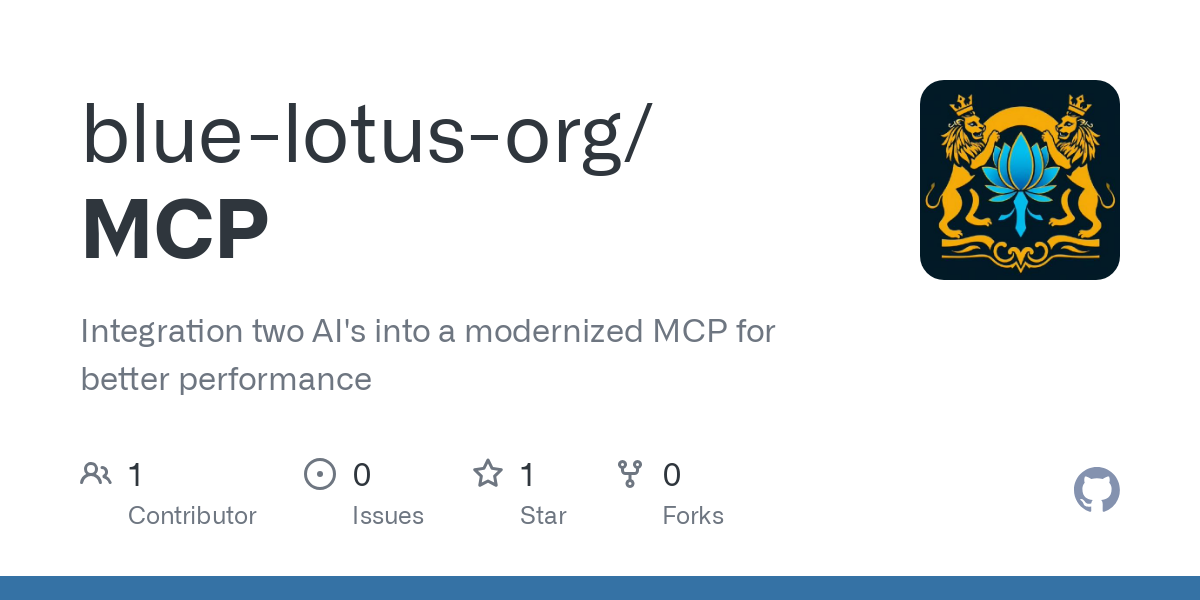blue_lotus_org
by blue-lotus-orgA modernized MCP server integrating Mistral and Gemini AI models for enhanced performance and unified tooling.
Unified AI Integration with Mistral and Gemini
Overview
The Unified AI Integration with Mistral and Gemini project modernizes the Model Context Protocol (MCP) to integrate two powerful AI models, Mistral and Gemini, into a single application. This implementation provides a unified interface for enhanced performance, cost optimization, and context sharing across AI systems.
Tools
- Mistral: Optimized for code and text processing.
- Gemini: Specializes in multimodal content generation.
- MCP Server: Acts as the orchestrator for managing interactions between the models and external tools.
Configuration
Protocol Specification
Define the MCP standard with the following components:
- Message Format (JSON Schema):
json { "request_id": "uuid", "model": "mistral|gemini|both", "content": {"text": "", "files": []}, "context": {"session": {}, "tools": []}, "routing_rules": {"fallback": "auto", "priority": 0-100} } - API Endpoints:
/mcp/process: Main processing endpoint./mcp/feedback: Response refinement loop./mcp/context: Session management.
Adapter Layer Implementation
Create model-specific adapters to translate MCP protocol to each AI's API.
Mistral Adapter:
class MistralMCPAdapter:
def process(self, mcp_request):
mistral_prompt = f"CONTEXT: {mcp_request['context']}\nQUERY: {mcp_request['content']}"
response = mistral.generate(mistral_prompt)
return self._to_mcp_format(response)
def _to_mcp_format(self, raw_response):
return {
"model": "mistral",
"content": raw_response.text,
"metadata": {
"tokens_used": raw_response.usage,
"confidence": raw_response.scores
}
}
Gemini Adapter:
class GeminiMCPAdapter:
def process(self, mcp_request):
if mcp_request['content']['files']:
response = gemini.generate_content(
[mcp_request['content']['text'], *mcp_request['content']['files']]
)
else:
response = gemini.generate_text(mcp_request['content']['text'])
return {
"model": "gemini",
"content": response.text,
"metadata": {
"safety_ratings": response.safety_ratings,
"citation_metadata": response.citation_metadata
}
}
Usage
Unified Processing Workflow
def unified_processing(mcp_request):
if mcp_request['model'] == 'both':
mistral_result = MistralAdapter.process(mcp_request)
gemini_result = GeminiAdapter.process(mcp_request)
return consensus_engine(mistral_result, gemini_result)
elif mcp_request['model'] == 'mistral':
return MistralAdapter.process(mcp_request)
elif mcp_request['model'] == 'gemini':
return GeminiAdapter.process(mcp_request)
else:
raise MCPError("Invalid model selection")
Context Management System
class MCPContextManager:
def __init__(self):
self.session_context = {}
self.tool_context = {
'database': SQLConnector(),
'apis': [SlackAPI(), GoogleWorkspace()],
'filesystem': S3Storage()
}
def update_context(self, session_id, new_context):
self.session_context[session_id] = {
'immediate': new_context,
'historical': self._rollup_context(session_id),
'persistent': self._load_persistent_context(session_id)
}
Tool Integration Layer
class MCPToolConnector:
def __init__(self, tool_type):
self.tool = self._initialize_tool(tool_type)
def execute(self, action, params):
try:
result = self.tool.execute(action, params)
return self._format_mcp_response(result)
except ToolError as e:
return self._format_error(e)
def _format_mcp_response(self, result):
return {
"tool_response": result.data,
"metadata": {
"execution_time": result.timing,
"confidence": result.accuracy_score
}
}
Security
Authentication Flow
- Client Request → MCP Gateway → JWT Validation
- Token Validation → Model Access Control List
- Request Logging → Encrypted Audit Trail
- Response Sanitization → Content Filtering
Rate Limiting Setup
mcp_rate_limiter = RateLimiter(
limits={
'mistral': TokenBucket(rate=100/60), # 100 requests/minute
'gemini': TokenBucket(rate=50/60),
'combined': TokenBucket(rate=75/60)
}
)
Deployment Strategy
Recommended Stack
services:
mcp_gateway:
image: nginx-plus
config:
rate_limiting: enabled
core_service:
image: python:3.11
components:
- model_adapter_layer
- context_manager
- tool_connectors
monitoring:
stack: prometheus + grafana
metrics:
- model_performance
- context_hit_rate
- tool_usage
Testing Framework
Implement 3-level verification:
- Unit Tests: Individual adapters and connectors.
- Integration Tests: Full MCP request flows.
- Chaos Tests: Model failure simulations.
Example Test Case:
def test_cross_model_processing():
request = {
"model": "both",
"content": "Explain quantum computing in simple terms",
"context": {"user_level": "expert"}
}
response = unified_processing(request)
assert 'mistral' in response['sources']
assert 'gemini' in response['sources']
assert validate_consensus(response['content'])
Key Advantages
- Unified Interface: Single protocol for both models.
- Context Sharing: Maintains session state across different AI systems.
- Tool Reusability: Common connectors work with both Mistral and Gemini.
- Cost Optimization: Smart routing based on model capabilities.
- Failover Support: Automatic fallback between models.
Disclaimer
The provided code examples may not produce real results and are intended as a conceptual guide. Use this foundation to build your own MCP-like framework.
Licenses
- MIT License
- Apache 2.0 License
Credit: Blue Lotus
Features & Capabilities
Categories
mcp_server
model_context_protocol
python
ai
mistral
gemini
api_integration
tool_integration
Implementation Details
Stats
0
Views
0
Favorites
1
GitHub Stars
Repository Info
blue-lotus-org
Organization

